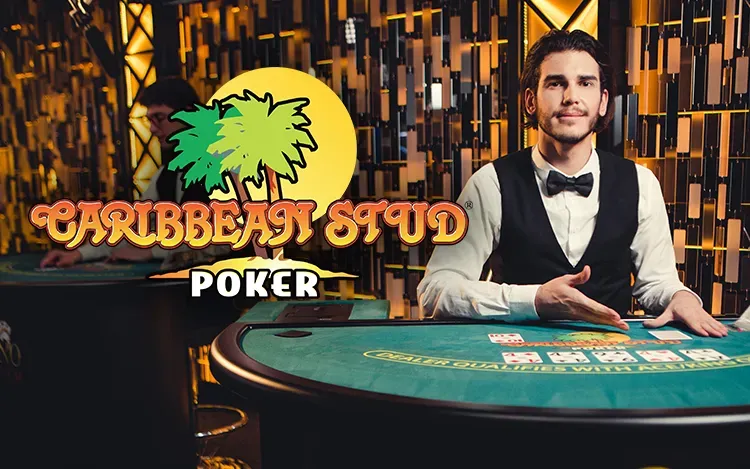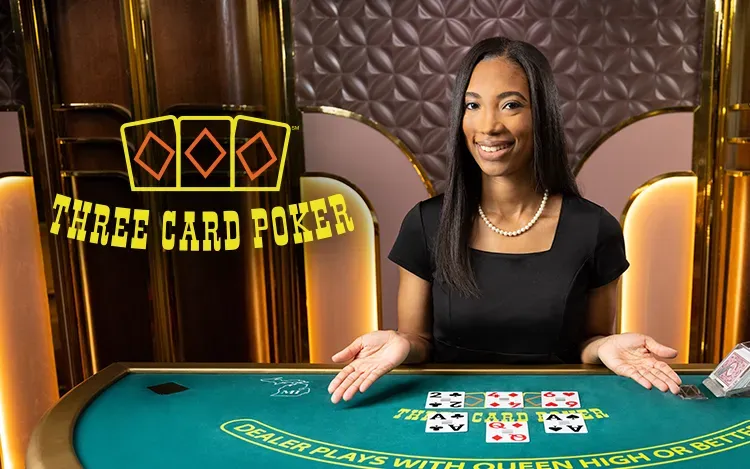

Poker is one of the most iconic and universally recognized card games, including in the UK. Whether portrayed in high-stakes scenes on the silver screen or hosting a casual poker night with friends, the allure of this card game has touched the lives of many.
With the aim to produce the highest value hands possible, or bluffing your way to convincing others to fold, Poker is a dynamic game unlike any other as players don’t only need to focus on their own hand, but try to read the other players at the table, hoping to catch someone in a costly bluff.
Thanks to modern technology, Poker no longer needs to be about wrangling up your mates or venturing out to your local casino. Now you can enjoy the best live poker games from the comfort of your own home, or even on the go via your smartphone. At Prime Casino, we boast a broad range of the top live poker games such as Community Poker, Draw Poker, and Stud Poker.

With worldwide fame comes a lot of experimentation and regional variants, which means that live poker doesn’t come in a single form. While some variants are niche and little heard of, some of the most popular variants of poker such as Community Poker, Draw Poker, and Stud Poker are all available in live casino format.

In stud variations, such as the live poker game Caribbean Stud Poker from Evolution players receive incomplete information since cards are dealt in a face-up and face-down combination during numerous betting rounds. Seven Card Stud was the most popular variation of poker until Texas Hold'em gained popularity in the 1970s.

This is the most popular variation of live poker seen in games such as Texas Hold’em Bonus Poker from Evolution Gaming. After being dealt their starting cards, players can combine them with the five community cards that are arranged in the middle of the table to form the best five-card poker hand.

In Three Card Poker, a distinct variant from traditional Draw Poker and often featured in games like Evolution's live poker, players receive three cards and must make the best hand possible. Unlike Five Card Draw, there is no option to 'draw' or swap out cards in Three Card Poker.
Every hand and every game in poker has its own set of rules, from figuring out the likelihood of receiving a particular hand to knowing when to fold, raise, and bluff. As you’ve seen in the section above, rules can also differ between variants. Therefore, this section will be a general overview of the core elements of Poker games shared across most types.
In Poker, the aim of the game is twofold; either you form the best hand by combining your cards with the three community cards dealt (the flop), the fourth card dealt (the turn), and the fifth card (the river), or, you bluff your players, convincing them with your gameplay actions and demeanour that you have the best hand, thus forcing others to fold (exit the round).
The rules of poker are displayed in the table below. Please note, that these rules form the basis for a round of Texas Hold’em, as it is the most popular live poker game variant, so if you’re playing stud poker, for example, the rules may differ slightly.
Players take their turns again and can choose the same options. If no one else wagers they can also ‘check’ which means they stay in the round without adding to the stakes. However, if a player calls or raises, players who have previously checked will need to call, raise, or fold.
The final round of betting can go round and round until all players have either folded or chosen to ‘stand’ (stay in the round until players reveal their final hands). A player can choose to go ‘all in’ and wager all of their remaining funds. This is a very risky choice, and should ideally be avoided.
The flop comes next which is where three community cards are dealt face up. These are cards shared between all players that are used in combination with the players' two hole cards to form a hand.
Play moves to the next player to the left of the blinds. The player can call (match the current bet), raise (increase the wager), or fold (exit the round). All players take their turn.
The two players to the left of the dealer are designated the small blind and the big blind. These players have to make a compulsory wager to start the pot.
Players are dealt their ‘hole’ cards face down. These cards are unique to the player and while they are able to peek at them, others cannot.
When all bets are made, the showdown occurs. This is where all players still in play reveal their hole cards. The player with the strongest hand will claim the entire pot.
Alternatively, if all other players fold, the player who is still in play will instantly win the pot. They can choose to reveal their hole cards or keep them secret.
When cards are revealed, and the pot claimed, the next round of poker can begin, with the roles of small and big blind moving one position to the left.
The Turn is next, which is where another community card is dealt face up, and the turn-taking process resumes.
The fifth face-up community card is the river. Once the card is revealed a final betting opportunity round occurs.
Poker is all about the value of the hand that you can create by combining your hole and community cards. Poker hands are ranked as follows starting from the lowest value to the highest:
A flush is 5 cards of the same suit. They do not need to be sequential and can be a mix of royal or number cards. The player with the most valuable card will win in case of a tie. If two players remain tied, then the second card, third card, and so on will be taken into account.
A Full House is a term you may have heard of before as it's used in games like Yahtzee. A Full House is three matching cards (of any suit), plus a matching pair of cards (of any suit). For example, a full house could comprise Q, Q, Q, 2, 2.
This is the best possible hand in the game. It is unbeatable, and if the poker game is played with one deck it is impossible for two players to have. A royal flush comprises the cards 10, J, Q, K, and A with all cards being the same suit.
A straight is 5 cards in numerical order. These can be of any suit. Because Ace is high, the lowest example of a straight is 2, 3, 4, 5, 6. If there’s a tie the player with the highest ranking card in their sequence wins.
This is the lowest-ranking hand. If no one has a pair then the person with the highest value card wins (Ace is high). In the case of a tie, the next highest card both players have is compared.
A player will have 4 matching cards of any suit. The remaining fifth card is known as the ‘kicker’ and in the case of a tie the player who has the highest value kicker will claim the pot.
This is 5 cards in numerical order of the same suit. The player who has the highest card as part of their sequence wins in the case of a tie.
A player has three matching cards. These cards can be different suits. If there’s a tie the player who has the highest card value wins.
A player has a pair of matching cards. In the case of a tie, the player whose pair is the highest in value wins.
A player has two matching pairs. In the case of a tie the player with the highest overall pair value wins.
When playing live poker there are various bets and decisions you can take and the table below enumerates these.
The Small Blind is the player sitting to the left of the dealer (known as the button). This is commonly viewed as the best seat for players to have. The Small Blind is required to add funds to the pot at the start of the round. The amount they are required to provide depends on the table limits of the game in question but the Small Blind’s wager will always be half of that of the Big Blind.
When you check you decline to wager further but wish to remain in the round. Think of it like passing in a board game or card game. Players cannot check if there has been betting during the round and if someone bets play will move around the table again with all players who checked required to wager or fold. If everyone in the round chooses to check then the round is complete.
The player seated to the left of the Small Blind is the Big Blind. The amount they are required to provide will depend on the table limits and is always double the value required by the Small Blind. After each round, the role of the Small and Big Blind moves to the player to the left. This means that the player that is the Big Blind will next become the Small Blind.
If you're confident in your hand you can choose to raise the stake. If you do this, all players who have called or checked must increase their wager to match yours (in the case of those who’ve called), Call the total raised amount (in the case of those who checked), or decide to fold.
This is a bet that really shouldn’t be used unless you can afford to lose the funds you’ve wagered, are taking part in a tournament, or in the rare case you have a Royal Flush. Going all in means you bet everything you have on the table.
Folding means you surrender and exit the round of poker. Players can only fold when it is their turn, and doing so outside of this is considered bad manners and some tables will even forbid this action.
When a player ‘calls’ they match the current bet. The minimum bet a player will be required to match is that of the Big Blinds' required funds.
This is the additional bet introduced during future stages of play. This value is compulsory and is placed by all players.
When playing live poker it can be easy to spot a rookie player a mile off if they display poor poker etiquette. To help you blend in with the pros, we’ve created a list of do’s and don’ts for live poker.
When you play live poker you should be fully invested in the game. A large part of poker is being observant and reading the room. For example, by paying attention you might pick up on the play habits of some of our opponents. Player A, for example, may always raise on the flop if they have an Ace, while Player B might always play until the river even if they have a low-value hand.
In poker there’s a term called ‘tilting’. This refers to the reckless mind-frame that players can gain when on a losing streak. Players who are tilting chase losses and bet far more impulsively, leading to more extensive losses. At Prime Casino we always want our players to play responsibly, and you can find resources for doing so at the bottom of every page on our site.
Live poker is a game that is meant to be played for fun and not to make money. While, yes, there are professional poker players out there, they represent the smallest percentage. Therefore, if you stop having fun when playing live poker, take a step back and stop.
Never chat about your hand with other players, even if you’ve already folded and are out of play. This information could benefit other players while putting others at a disadvantage not to mention you nattering while other players are trying to focus is a huge distraction. Similarly, you should never misrepresent what you have in your hand.
When playing live poker don’t disrespect the dealer or your fellow player. It can be frustrating to finally get a high-value hand only to discover another player just so happens to get a royal flush, but getting angry and shouting at other players, or accusing the dealer of shady dealing will get you in a lot of hot water.
Poker takes place over several rounds split into turns. Each player will get their turn each round. When playing you need to pay attention to when it is your turn, as delaying play or acting outside of your turn (such as folding), is poor etiquette.
Live poker is often confused with video poker, but the two types of game couldn’t be more different. The table below compares live poker, video poker, and traditional poker.
| Criteria | Live Poker | Traditional Poker | Video Poker |
|---|---|---|---|
| Variety of Games | A broad range of poker variants such as Texas Hold'em Bonus Poker, and Caribbean Stud Poker, as well as more niche variants. | Offers the most common variants of poker depending on whether or not the venue has an emphasis on poker (i.e. some venues focus more intensely on slots, roulette, etc). | Video poker is a single-player game and offers electronic gameplay in a selection of variants. |
| Fairness and Integrity | A real-world dealer shuffles and deals the cards to ensure fairness. | Trained dealers are hired by the venue and handle cards with fairness and integrity. | Electronic systems such as RNG (random number generation) are used to ensure a fair outcome. |
| Competitive Skill Level | Players of any skill level can participate in live poker, so long as their budget matches the table limits. | Players' skills will depend on those attending the venue. | As the player plays against a computer, players will need to apply poker strategies. |
| User-Friendly Interface | Live poker can be played on all devices, so the user interface of games is carefully formulated to ensure ease of play. | Physical poker tables may vary in their design and the comfort offered (such as chairs or stools). Accessibility both to the venue and the table may be limited. | Players are presented with an electronic UI. Like live poker, video poker has been designed for ease of play on all devices. |
| Player Interaction | Chat features may be included but also may be limited. | Players interact with other players in a face-to-face manner, meaning that physical ‘tells’ can be more easily observed. | No social interaction as video poker only supports solo gameplay. |
| Tournaments and Events | Live tournaments may be offered at select online sites. | Physical casinos will often host and promote tournaments as well as poker-related special events. | No events or tournaments are offered. An online casino may offer a promotion for video poker, but this is rare. |
| Rewards and Bonuses | Any rewards or bonuses will be specific to the casino or table in question. | The rewards and bonuses on offer are usually venue-specific, or, at most, will be shared across a few casinos of the same brand. | Players may accrue loyalty points by playing video poker and some video poker games come with bonus elements. |
| Security and Trust | Players need to trust the online venue. Top online sites will be regulated by recognised authorities and data will be encrypted. | Players need to trust the management team of the physical venue, as well as word-of-mouth from local players. | All online casinos which offer video poker will only host games which are third-party tested to ensure fair play. |